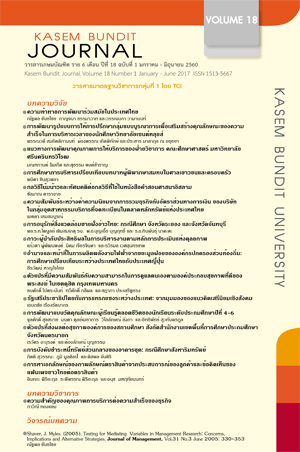รัฐเสรีประชาธิปไตยกับการแทรกแซงระหว่างประเทศ: จากมุมมองของแนวคิดเสรีนิยมเชิงสังคม
Keywords:
เสรีนิยมเชิงสังคม, รัฐเสรีประชาธิปไตย, การแทรกแซงระหว่างประเทศ, social liberalism, liberal democratic state, international interventionAbstract
บทความนี้มีวัตถุประสงค์เพื่อวิเคราะห์ถึงรูปแบบของการแทรกแซงที่เหมาะสมของรัฐเสรีประชาธิปไตยและประชาคมระหว่างประเทศต่อกิจการภายในของรัฐอื่นๆ ทั้งที่เป็นรัฐเสรีประชาธิปไตยและรัฐที่มิใช่เสรีประชาธิปไตย ดยใช้แนวคิดเสรีนิยมเชิงสังคม (Social liberalism) เป็นกรอบแนวคิดในการวิเคราะห์ ผลการศึกษาพบว่า รูปแบบการปกครองของรัฐที่ละเมิดสิทธิมนุษยชนและประชาธิปไตยส่งผลต่อความชอบธรรมและรูปแบบของการแทรกแซงของรัฐเสรีประชาธิปไตย กล่าวคือ ประการแรกรัฐเสรีประชาธิปไตยมีเหตุผลเพียงพอในการดำเนินแทรกแซงเพียงแค่รัฐที่มิใช่เสรีประชาธิปไตยนั้นละเมิดหลักสิทธิมนุษยชนและประชาธิปไตยของตน โดยไม่จำเป็นต้องคำนึงเหตุผลอื่น เพราะทั้งสองไม่ได้มีความสัมพันธ์ต่อกันอย่างแน่นแฟ้นหรืออยู่ในชุมชนการเมืองเดียวกัน ทั้งนี้ รูปแบบการแทรกแซงที่เหมาะสมของรัฐเสรีประชาธิปไตยต่อรัฐที่มิใช่เสรีประชาธิปไตยตามแนวคิดเสรีนิยมเชิงสังคม ได้แก่ การประณาม การแทรกแซงเพื่อมนุษยธรรม และมาตรการลงโทษทางเศรษฐกิจแบบมุ่งเป้าหมาย ประการที่สอง รัฐเสรีประชาธิปไตยมีความชอบธรรมในการดำเนินการการแทรกแซงกิจการของรัฐเสรีประชาธิปไตยด้วยกัน เฉพาะกรณีที่รัฐเสรีประชาธิปไตยนั้น ๆ ละเมิดกฎเกณฑ์ที่กำหนดไว้ร่วมกันหรือมีพฤติกรรมเบี่ยงเบนไปจากบรรทัดฐานของสังคมเสรีหรือคุณค่าอันสูงส่งที่พึงรักษา โดยเฉพาะการละเมิดประชาธิปไตยและสิทธิมนุษยชน ทั้งนี้ นอกจากรูปแบบการแทรกแซงดังกล่าวแล้ว รูปแบบการแทรกแซงรูปแบบอื่น ๆ ที่สำคัญของรัฐเสรีประชาธิปไตยต่อรัฐเสรีประชาธิปไตยตามแนวคิดเสรีนิยมเชิงสังคม ได้แก่ มาตรการลงโทษทางเศรษฐกิจ
The purpose of this article was to analyze the appropriate forms of interventions of liberal democratic states and international community in the internal affairs of other states- both liberal democratic and non-liberal democratic states. The social liberalism approach was applied as a framework. It was revealed that the regime type of the states, which committed human rights violations and undemocratic practices, affected legitimacy and types of international interventions in the domestic affairs of those states as follows: Firstly, liberal democratic states had strong enough reasons to interfere in non-liberal democratic states when the latter violated human rights and democratic norms, although both were not members of the same political community or did not have close relationship. Condemnation, humanitarian intervention, and targeted sanctions were the forms of interventions of liberal democratic states in the non-liberal democratic states. Secondly, from social liberal perspective, liberal democratic states had the legitimacy of interventions in other liberal democratic states when the latter violated the set of shared rules and regulations, or deviated from social norms of liberal society or the shared value, especially when they committed a massive scale of injustice and human rights violations. In addition to the forms of interventions as mentioned above, economic sanctions, in social liberalism perspective, were main forms of interventions of liberal democratic states in liberal democratic states.
Downloads
Published
How to Cite
Issue
Section
License
ทัศนคติ ความคิดเห็นใด ๆ ที่ปรากฏในวารสารเกษมบัณฑิตฉบับนี้เป็นของผู้เขียน โดยเฉพาะ มหาวิทยาลัยเกษมบัณฑิตและบรรณาธิการ ไม่จำเป็นต้องมีความเห็นพ้องด้วย







